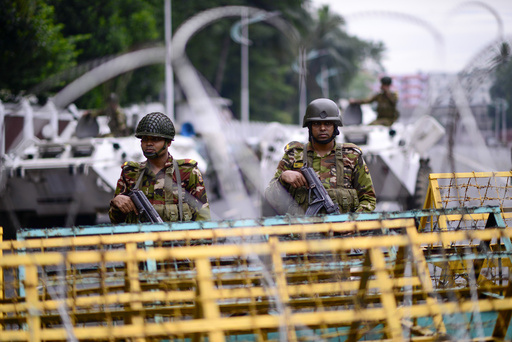
DHAKA, Bangladesh — On Thursday night, the headquarters of the Jatiya Party, a political group supporting Sheikh Hasina, the recently ousted leader of Bangladesh, was set ablaze by assailants, according to various media reports. The situation remains unclear regarding any injuries resulting from the incident.
Reports indicate that the attackers invaded the party’s offices located in Dhaka’s Bijoy Nagar area and engaged in confrontations with party members present at the time, ultimately resulting in the building being set on fire.
The extent of the destruction caused by the fire is still unknown. Firefighters promptly arrived on the scene, as noted by Rashed bin Khaled, an official from the Fire Service and Civil Defense, who shared the information via phone. He was unable to provide further details about the incident.
The Jatiya Party is recognized as the third-largest political party in the country and was originally established by the former military ruler H.M. Ershad during the 1980s.
During the fire incident, a notable figure from the student protest movement that contributed to Hasina’s downfall in August emphasized the necessity of “destroying” the Jatiya Party for its allegiance to her administration. Hasnat Abdullah, a leader within the Anti-Discrimination Student Movement, labeled the Jatiya Party as a “national betrayer” in a Facebook post.
Abdullah called on fellow students to assemble at Dhaka University and march towards the Jatiya Party’s headquarters to demonstrate their discontent.
Mujibul Haque Chunnu, the general secretary of the Jatiya Party, pointed a finger at the student movement for inciting the assault. He remarked, “People are watching what they are doing with us. It is live on social media … they are carrying out these actions publicly.”
Since 2009, Hasina’s Bangladesh Awami League has governed the country. Her opponents claim that the Jatiya Party has served to lend a false sense of democracy to Hasina’s rule, particularly as several major political parties abstained from participating in elections.
Hasina fled to India on August 5 following a wave of protests led by students, which escalated into a broader anti-government movement. The unrest has resulted in the deaths of hundreds, including students and security personnel, during violent clashes.
In the aftermath, many others, including supporters of Hasina, fell victim to vengeance attacks or mob violence throughout the nation. Presently, there are active arrest warrants against Hasina for her alleged involvement in the July and August bloodshed.
In August, Muhammad Yunus, a Nobel laureate from Bangladesh, assumed leadership of an interim government that is supported by the student movement and the military’s influence. Nevertheless, his administration continues to face challenges in reestablishing order in the country.
